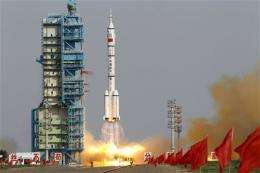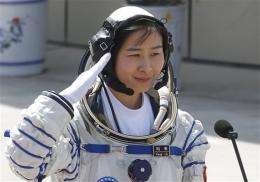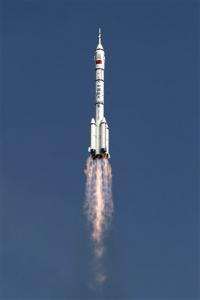Shenzhou 9 spacecraft rocket launches from the Jiuquan Satellite Launch Center in Jiuquan, China, Saturday, June 16, 2012. China sent its first woman and two other astronauts into space Saturday to work on a temporary space station for about a week, in a key step toward becoming only the third nation to set up a permanent base in orbit. (AP Photo/Ng Han Guan)
(AP) — A spacecraft carrying China's first female astronaut and two male crew mates made a planned course change Sunday en route to docking with an orbiting module, state television reported.
The Shenzhou 9 capsule was launched Saturday on China's most ambitious space mission yet in a step toward building a permanent space station.
The spacecraft carried out the first of five planned orbit changes early Sunday, state television said. The capsule is to dock Monday with the Tiangong 1 module 343 kilometers (213 miles) above Earth.
Liu Yang, a 33-year-old air force pilot who is China's first female space traveler; mission commander and veteran astronaut Jing Haipeng, 45; and crew mate Liu Wang, 43, are to spend at least 10 days in space.
"The astronaut crew are in good shape and everything is going according to plan," China Central Television said in its midday news program.
Two of the astronauts will live and work inside the module while the third remains in the capsule in case of emergency. The astronauts are to conduct medical tests and other experiments before returning to Earth.
China's first female astronaut Liu Yang salutes during a sending off ceremony as she departs for the Shenzhou 9 spacecraft rocket launch pad at the Jiuquan Satellite Launch Center in Jiuquan, China, Saturday, June 16, 2012. China will send its first woman and two other astronauts into space Saturday to work on a temporary space station for about a week, in a key step toward becoming only the third nation to set up a permanent base in orbit.(AP Photo/Ng Han Guan)
China is hoping to join the United States and Russia as the only countries to send independently maintained space stations into orbit. It is already one of just three nations to have launched manned spacecraft on their own.
Another manned mission to the module is planned later this year, while possible future missions could include sending a man to the moon.
The space program is a source of national pride, reflecting China's rapid economic and technological progress and ambition to be a global leader.
The selection of the first female astronaut is giving the program an additional publicity boost.
The Tiangong 1 is due to be replaced by a permanent space station around 2020. That station is to weigh about 60 tons, slightly smaller than NASA's Skylab of the 1970s and about one-sixth the size of the 16-nation International Space Station.
Shenzhou 9 spacecraft rocket launches from the Jiuquan Satellite Launch Center in Jiuquan, China, Saturday, June 16, 2012. China sent its first woman and two other astronauts into space Saturday to work on a temporary space station for about a week, in a key step toward becoming only the third nation to set up a permanent base in orbit. (AP Photo/Ng Han Guan)
China has only limited cooperation in space with other nations and its exclusion from the ISS, largely on objections from the United States, was one of the key spurs for it to pursue an independent space program 20 years ago.
China first launched a man into space in 2003 followed by a two-man mission in 2005 and a three-man trip in 2008 that featured the country's first space walk.
In November 2011, the unmanned Shenzhou 8 successfully docked twice with Tiangong 1 by remote control.
Shenzhou 9 is to dock with the module by remote control, then separate and dock again manually to test the system's reliability.
Copyright 2012 The Associated Press. All rights reserved. This material may not be published, broadcast, rewritten or redistributed.


























